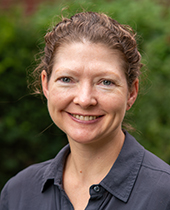Laurel Harbridge-Yong
Professor of Political Science
IPR Associate Director and Fellow
PhD, Political Science, Stanford University, 2009
Laurel Harbridge-Yong’s work focuses on how elections, institutions, and policy are connected in the United States. Her research explores a range of questions surrounding partisan conflict and the difficulty of reaching bipartisan agreement and legislative compromises in American politics. Her research spans projects on Congress, state legislatures, and the mass public. Her 2015 book explored declining bipartisan cooperation in Congress, changes in party strategy and the ramifications of these changes for the responsiveness of members to their constituents and for policy formation. Her 2020 book explored how legislators’ perception of primary voters discourages legislative compromise. Her current research examines the power of primary voters in American politics and how worrisome trends of threats and violence toward elected officials alter our democratic politics. She is IPR's associate director.
Current Research
The Primary Premium: Why Legislators are Incentivized to Side with Primary Voters over General Election Voters. To many observers, American politics appears broken as the two parties vehemently disagree over policy and even basic facts. One component of this conflict is legislators’ attentiveness to the preferences of their primary voters rather than the broader electorate. In joint work with Sarah Anderson at UC Santa Barbara and Daniel Butler at Washington University St. Louis, Harbridge-Yong builds on a finding of their 2020 book—legislators believe the views of their primary and general electorates often diverge and that when they diverge, their political careers are better served by being responsive to the wishes of their primary voters. In this project, they examine the incentives legislators have to be more responsive to primary election than general election voters. They theorize and show that legislators have incentives to be more responsive to primary voters because primary voters are more unified in their policy preferences and because voters in primaries are more responsive to the policy positions of incumbents than voters in general elections. The findings have implications for representation of the views of underrepresented voters and the role of primary elections in polarization.
Supporting Losing Candidates and Its Implication for Primary Electorates. Presidents and presidential candidates have a platform by which they can exert influence through persuasion. But they also may shape electoral participation within their party. In joint work with Daniel Butler at Washington University in St. Louis, Hans Hassell at Florida State University, and Sarah Anderson at UC Santa Barbara, Harbridge-Yong argues that co-partisan supporters who back losing candidates in the primary are less likely to participate in subsequent primary elections. Utilizing data on campaign donors between 1984 and 2020 and the American National Election Study (ANES) panel from 2016-2020, they find that supporters of losing candidates are less likely to participate via voting or campaign donations in subsequent primary elections. This effect holds across both major parties and shapes the partisan landscape by altering the composition of the primary electorate. These findings reveal that the disengagement of losing candidate supporters consolidates support for the winners, creating a primary electorate skewed towards the presidential nominee's faction. These dynamics highlight an important mechanism through which presidential nomination outcomes influence broader political processes, reshaping intraparty coalitions and legislative agendas.
What Are The Consequences of Threats and Violence Against Elected Officials? Elected officials, staff and election workers across federal, state and local politics In the U.S. have experienced a rise in harassment, threats and violence. In joint work with Alexandra Filindra of the University of Illinois at Chicago, Harbridge-Yong examines how this worrisome trend affects our democratic politics. For elected officials and their staff, how do these experiences change how they approach governing or engaging with constituents and whether they want to stay in public service? For the public, does the partisan nature of this political violence further reinforce partisan animosity and support for undemocratic behaviors? Harbridge-Yong and her co-author are exploring these questions through extensive Interviews with elected officials and staff, surveys of elected officials, and public opinion surveys.
Selected Publications
Books
Anderson, S., D. Butler, and Harbridge-Yong, L. 2020. Rejecting Compromise: Legislators’ Fear of Primary Voters. New York: Cambridge University Press.
Harbridge, L. 2015. Is Bipartisanship Dead? Policy Agreement and Agenda-Setting in the House of Representatives. New York: Cambridge University Press.
Journal Articles and Chapters
Anderson, S., B. Burden, D. Butler, L. Harbridge-Yong, and T. Ryan. 2025. Information and perceptions of electability in primary elections. Political Behavior.
Harbridge‐Yong, L. and W. Snead. 2025. Interest groups and intra‐party conflict on scored votes. Legislative Studies Quarterly 50(4): e70013.
Anderson, S., B. Burden, D. Butler, L. Harbridge-Yong, and T. Ryan. 2025. Sources of candidate fundraising affect perceptions of electability. American Politics Research.
Anderson, S., D. Butler, L. Harbridge-Yong, and Z. Nemerever. 2024. Legislator pivotality and voter accountability. Political Research Quarterly 77(3): 904–14.
Anderson, S., D. Butler, L. Harbridge-Yong, and R. Marshall. 2023. Top-four primaries help moderate candidates via crossover voting: The case of the 2022 Alaska election reforms. The Forum 21(1): 123–36.
Harbridge-Yong, L., C. Volden, and A. Wiseman. 2023. The bipartisan path to effective lawmaking. The Journal of Politics 85(3): 1048–63.
Anderson, S., D. Butler, L. Harbridge-Yong, and G. Markaraian. 2023. Driving legislators' policy preferences: Constituent commutes and gas taxes. Legislative Studies Quarterly 48(1): 203–18.
Filindra, A. and L. Harbridge-Yong. 2022. How do partisans navigate intra-group conflict? A theory of leadership-driven motivated reasoning. Political Behavior 44: 1437–58.
Harbridge-Yong, L. and C. Paris. 2021. You can’t always get what you want: How majority-party agenda-setting and ignored alternatives shape public attitudes. Legislative Studies Quarterly 46(2): 323–56.
Harbridge-Yong, L. 2020. Congressional capacity and bipartisanship in Congress. In Congress Overwhelmed: The Decline of Congressional Capacity and Prospects for Reform, eds. L. Drutman, K. Kosar, and T. LaPira (Chicago: University of Chicago Press).
Doherty, D. and L. Harbridge-Yong. 2020. The effects of blaming others for legislative inaction on individual and collective evaluations. Legislative Studies Quarterly 45(1): 69–99.
